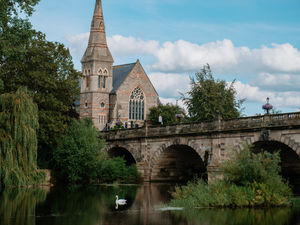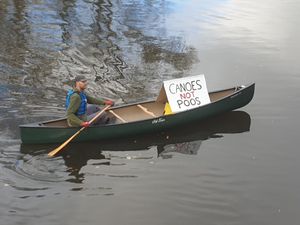Severn Trent 'to be held to account' over sewage dumped into Shropshire rivers
Water companies will be held to account over river pollution in a bid to clean up waterways across the region, Shropshire Council has pledged.

Councillors say the frequent discharge of sewage into rivers is making them unsafe for people who use them, impacting fish populations and threatening whole ecosystems.
The authority has now promised to put pressure on Severn Trent and Welsh Water to invest in drainage improvements and provide timescales for mitigating the effect of sewage and other pollutants being released into Shropshire’s rivers.
A dedicated group will also be set up to address the issue with both water companies, with input from the Environment Agency.
Back in 2020, Severn Trent was fined £800,000 for letting 3.8 million litres of raw sewage into a Shropshire stream near one of its treatment works.
The issue was raised at a meeting of the full council by Labour councillor Kate Halliday, who represents Belle Vue in Shrewsbury, on the same day a report from the Environmental Audit Committee, chaired by Ludlow MP Philip Dunne, warned a “chemical cocktail” of pollution in UK rivers was putting public health at risk.
Councillor Halliday said the main problem was the heavy reliance on combined sewage overflows (CSOs) in old drainage infrastructure.
CSOs, which mix rainwater and domestic waste, release directly into rivers when they become overwhelmed during heavy rainfall.
She said that since water companies were privatised in 1989 water bills had increased in real terms by 40 per cent, while investment in sewage networks had been cut by a fifth.

Councillor Halliday said: “Campaigners for cleaner rivers would suggest that some companies have chosen to dump sewage into rivers rather than invest adequately in treatment systems, and you can kind of see their rationale.”
She said the passing of the Environment Act last year was welcome but did not place a legal duty on water firms to end the practice of discharging sewage into rivers.
“It’s therefore really important that Shropshire Council plays an active role in holding key partners to account,” she said.
“This motion puts forward some practical suggestions on how we can achieve this and hopefully start to improve the water quality that the residents and wildlife in Shropshire deserve.”
The motion received unanimous support across the chamber.

Councillor Rosemary Dartnall, who represents Bayston Hill, Column and Sutton, said: “Rivers support life in a fundamental way. They distribute water extensively and when healthy and clean provide habitat for many types and species of vegetation and wildlife.
“Collectively these life forms constitute a healthy river course ecosystem.
“Healthy rivers are essential to support and retain biodiversity amongst other things.
“Polluted rivers lead directly to the decline of river course ecosystems, something to be avoided at all costs.
“The death of a river ecosystem leads in time to increased flooding events as the natural vibrant storage flux of the unhealthy river course loses its natural ability.”
Councillors Heather Kidd, Tom Biggins and Edward Towers said there was concern in their areas – Chirbury and Worthen, Whitchurch and Wem respectively – that the capacity of local sewage networks would not be able to cope with any new house building until improvements were made.
Seconding the motion, Radbrook councillor Julia Evans said: “It’s a huge problem, with an antiquated sewage system that was basically built in the Victorian times and hasn’t had much funding and investment since.
“It’s holding these water companies to account that they need to invest more money into the sewage system.”
Speaking after the meeting, Councillor Halliday said: “I am very pleased that I had support from councillors of all parties to take action with the water companies, and hope that this will have the effect of improving the quality of river water that the people and wildlife of Shropshire so rightly deserve.
“Many members of the public are extremely concerned about this issue, including anglers across the county and I can confirm that I received correspondence from Severn Trent yesterday acknowledging the motion and offering to meet with myself and colleagues, and so we are already having an impact.”
A spokesman for Severn Trent said: "We’re passionate about taking care of the environment, and although at Severn Trent we don’t own our region’s rivers, we take our role in protecting and caring for them extremely seriously.
"Our rivers are currently the healthiest they have been since the Industrial Revolution and we’ve been consistently recognised as a leading UK water company and awarded the very highest 4 star status by the Environment Agency because of the care we take with our rivers and the environment.
"We’re committed to nature and our environment and we have consistently supported the Environment Act that now provides a to do list for all sectors that impact on river quality over a 25-year period. Assuming everyone, across all sectors successfully delivers the work on their to do list, rivers will reach Good Ecological Status. We’re committing to complete our actions in a nine-year time frame by 2030, rather than the 25-year target.
"Storm overflows, which are used in heavy rain to prevent flooding in customer homes and businesses, account for 3.5 per cent of rivers not achieving good ecological status. We’re working hard to use overflows less and we’re investing £100m a year to go even further in improving rivers so that nature can continue to thrive. We’ve already reduced the impact our operations have on rivers by around 10 per cent in little over a year.
“Across our region, agriculture and land management are the biggest contributors to rivers and other water courses not achieving good ecological status. Agriculture accounts for 36 per cent of all river pollutions, and although we aren’t responsible for their actions, we want to take a leading role in helping farmers to care for rivers, which is why we are working with 9,000 farmers to prevent pesticides and other run off that harm nature reaching our rivers.
“By 2025, we will have restored 4,000km of rivers in our region as part of our Great Big Nature Boost. We’ve recruited a team of River Rangers to help educate communities and monitor rivers and, as part of our £566million Green Recovery Programme - the biggest investment of any water company in our green future - we’ll be the first water company to create bathing standard rivers in the UK, including along stretches of the River Teme in Shropshire.”





